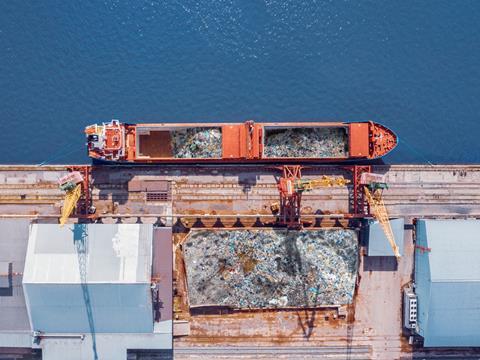
In a new position paper, The European Recycling Industries’ Confederation (EuRIC) cautions against Europe becoming reliant on plastic imports from outside the EU and facilitating unfair competition, instead recommending that minimum recycled plastic targets are met using post-consumer plastic packaging waste sourced on the continent.
According to EuRIC, plastics recycling in Europe is suffering from an uncontrolled surge of imports of cheap plastics, both virgin and labelled as recycled. Most are said to originate from countries with fewer measures in place to pursue circularity, meaning the materials fall short of EU standards and fail to contribute to the continent’s circularity targets.
Consequently, recyclate prices are said to have decreased by up to 50% last year, and they are not expected to recover in 2024. Companies are thus operating well below their production capacity, despite some having invested large sums of money into their circularity goals, and more temporary unemployment schemes have been introduced.
With the introduction of the Waste Shipment Regulation and an upcoming ban on plastic waste shipments from the EU to non-OECD countries, European plastics recyclers will rely on treating plastic waste and selling recycled plastics on the European market. EuRIC warns that, if the ‘unbalanced pressure’ on recyclers is not addressed, Europe could miss its legally binding recycling and recycled content targets, stifle the growth of green jobs, cause losses of industrial jobs and infrastructure, and cause companies to relocate outside Europe.
EuRIC calls for the Packaging and Packaging Waste Regulation to mandate that minimum recycled content targets for plastic packaging put on the EU market must be met using post-consumer plastic packaging waste collected in the EU. This is set to align with the PPWR’s Impact Assessment, in which the recycled content of plastics aims to boost recycling within Europe.
Furthermore, a robust traceability system verified by an independent third party is recommended to ensure that plastics labelled as recycled are actually recycled according to EU standards.
Implementing such measures is expected to level the playing field between importers and European plastics recyclers, as well as make certain that non-EU operators are not subsidized by recycled content designed to wean the EU off extracted raw materials and increase investments in circular value chains.
EuRIC emphasizes its support for a Green Industrial Deal, yet it emphasizes its stance that Europe should not rely on non-European producers with differing expectations of circularity, energy, and labour costs, warning that these circumstances could result in unfair competition from outside the EU.
In a related warning, Plastics Recyclers Europe drew attention to low demand for recyclate produced in the EU and high imports from outside the continent. Like EuRIC, it recommended an independent third-party certification system to ensure transparency and traceability.
It has also encouraged the EU to drive competitiveness and innovation for plastics, listing science-based policies, traceable imports, and realistic targets amongst its recommended points of priority.
If you liked this article, you might also enjoy:
The Lidl approach to packaging sustainability
How did Brazil achieve its 100% aluminium can recycling rate – and can it be replicated in the EU?
Experts have their say on the EU’s Packaging and Packaging Waste Directive revisions
A deep dive into the most important packaging sustainability trends and solutions














No comments yet